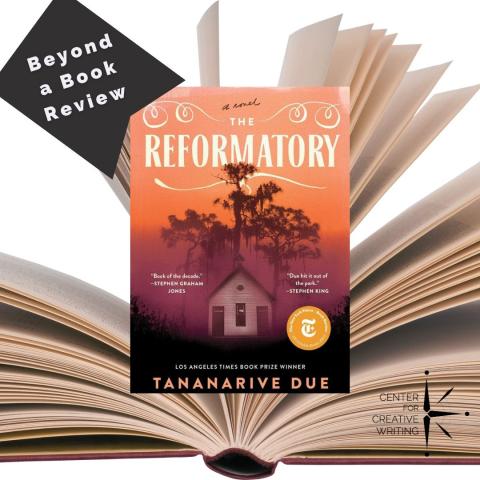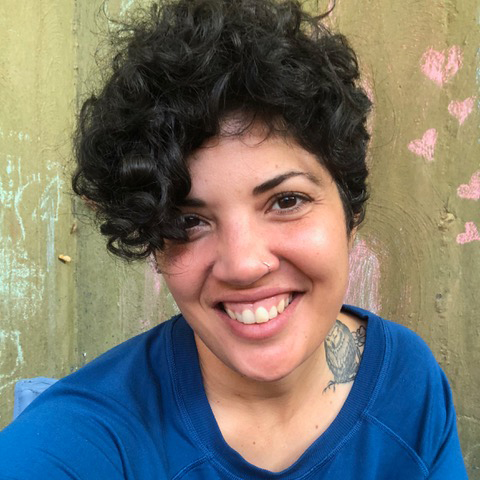
Shawna Ayoub moves "beyond a book review" in not only recommending great books by diverse writers but highlighting a technique to apply to your own writing practice.
The Reformatory, by Tananarive Due
Truly brilliant Black speculative fiction writer Tananarive Due has served up some unforgettable historical horror with The Reformatory, a novel that takes place in Gracetown, Florida, during the Jim Crow era. This book was hard to read. It’s another book cover that I stared at between other reads asking myself, “Do I have the spoons for this?” I knew it was going to be triggering. After all, the horror in this story is based on historical fact. There were reformatories. Little boys like Robbie Stephens were sentenced to serve prison terms that doubled as slavery (ahem, California wildfires, ahem). And they suffered extreme abuse and death at the hands of their captors. All under the name of American reform.
If this sounds familiar, especially as prison camps are being resurfaced as legal for immigrants and Others, and you feel afraid, I apologize.
Books like The Reformatory need to be written and read, just as Number the Stars was a necessary exploration of the Holocaust for teen readers. We need to know our history to prevent it happening again. Or, in the case of history repeating itself, to know what steps dissenters took and to build on their platforms.
What makes The Reformatory speculative is the presence of ghosts, or haints. Robbie, sentenced to six months at the titular detention center for kicking a white boy who made inappropriate advances on his older sister, Gloria, can see the haints. He is conscripted to help the warden capture these haints to shorten his sentence and receive special treatment for himself and his friends. Disagreement is not an option, and even cooperation proves to have undesirable consequences. As Gloria works from the outside to get Robbie freed, she is also dodging racially motivated attacks.
Hate, privilege, and erasure
This book is an accurate representation of how hate thinking leads to hate crimes. That’s the true horror. It is a powerful depiction of what Black Americans continue to experience as they challenge a system built on the assumption of access to their labor. Bucking that system means fighting those who like the privileges it provides; those who are comfortable demeaning another group of humans to maintain their status quo. Finally, it is also an examination of what white America wants to erase and why. (Not sure what that could be? Definitely read this book.)
Have you ever wished you could forget something? Or that the world could forget? I have. But usually, I backtrack right away because I don’t want to lose what I’ve learned. I end up reflecting on movies like Eternal Sunshine of the Spotless Mind and wonder what we will keep repeating if we forget. Then I realize I don’t have to wonder. I was raised in the American school system. As a person with a foreign heritage, it was easy for me to see through the false histories American academics offered. I remember marking through lines in my textbooks and writing in corrected information for the next student about the Middle East thinking, “Maybe there will be one less white person calling me ‘Jee-had’ or asking if I have a bomb in my backpack.”
A writing exercise
The thing is, we learn from the past, be it trash or triumph. So, for our writing prompt, let’s do a little thought exercise. Chances are, if you are a minority, this is something you won’t have to think hard about because you’ve survived gaslighting. If so, maybe dive into that.
Write about how life would be different if you could erase a moment, experience, person, or pet from life, either yours or the world’s. Give yourself over to this for 20 minutes. If this presence had never been present, what would change? Who wouldn’t have met? What would be gained? Lost? Learned? And so on. This can be overwhelmingly positive, negative, or neutral.
Afterward, take five minutes to describe how this writing made you feel. Did it bring anything up for you? Is it something you’ll come back to? Why or why not?
If this book sounds intriguing to you, consider preordering your own copy of The Reformatory at Bookshop.org (or purchasing the three books separately) and supporting independent bookstores across the U.S.
More book reviews and recommendations
Want to receive prompts, tips, and inspiration like this in your inbox every Sunday morning? Join our email list community! You will receive weekly advice, a year’s worth of weekly writing prompts as a FREE download, and be eligible to participate in our monthly photo prompt contest for a chance to share an original piece of writing with our community of more than 2,500 writers.
